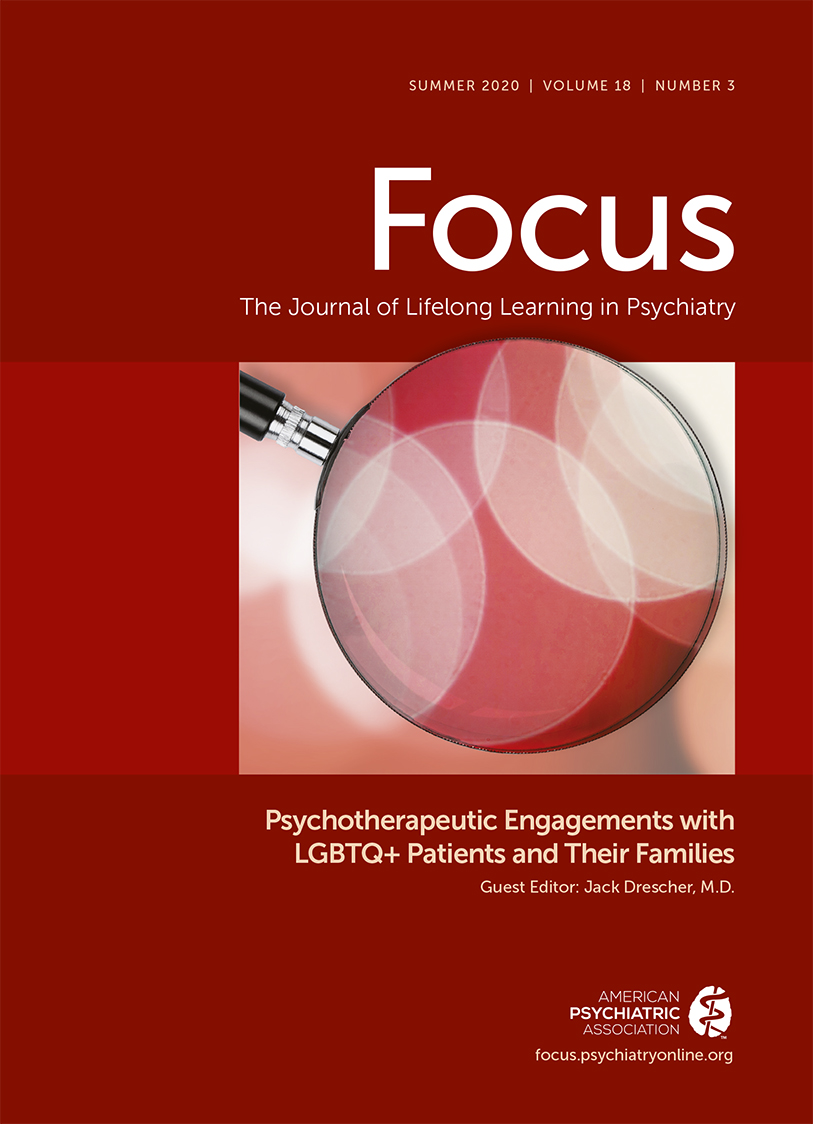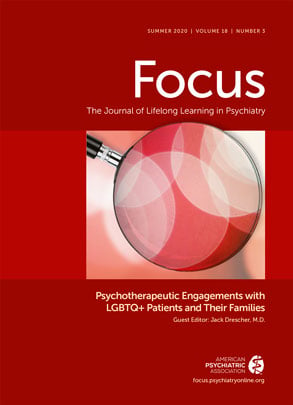When I was invited to edit this issue of Focus on working with LGBTQ+ patients, I saw an opportunity to correct a serious omission in the professional training of psychiatrists and other mental health professionals: knowledge about human sexuality and gender. I know this is the case as a psychiatrist and psychoanalyst frequently invited to lecture about issues dealing with sexuality and gender. I often ask audiences to respond to two questions with a show of hands: Do you feel you received adequate training about human sexuality and gender in your formal training programs? and Have you sought out training about human sexuality and gender since completing your formal training programs?
In response to both questions, most in the audience do not raise their hands. If professionals are not being trained, what information do they use when patients raise questions in treatment about gender or sexuality? I have learned that clinicians often respond to patient accounts of, and questions about sexual and gender identity concerns by responding on the basis of personal experience, recalling a lecture attended in college or graduate school, or simply relying on their own imagination to craft a response, or “winging it.”
I have also heard many clinicians say, “I treat my gay patients just as I do my heterosexual ones.” Laudable as this attitude may be, particularly given the history of mental health professionals’ animus toward gay patients (
1), it is a stance that ignores how growing up LGBTQ+ is a very different cultural experience than growing up as heterosexual and cisgender. Inevitably, specific issues, some of them outlined in this issue, come up when a patient lives life as a member of a sexual minority.
After I was asked to be guest editor of this issue, I immediately knew where to find knowledgeable contributors: The LGBT Committee of the Group for Advancement of Psychiatry (GAP). For those unfamiliar with the organization, GAP is a psychiatric “think tank” founded in 1947 following its founders’ successful provision of modern psychiatric care to soldiers in the field during World War II. Psychiatric leaders in the armed forces returned the United States and found an inadequate system of civilian care and a need for professional leadership for the postwar clinical needs of the nation. In the years that followed, GAP (
https://ourgap.org) has evolved into an organization of diverse expert committees that address timely questions facing American psychiatry.
The GAP committee on LGBT issues was appointed in 2003, continuing the work done by GAP’s Committee on Human Sexuality (
1). To date, the LGBT Committee’s publications include an online LGBT mental health curriculum (
2,
3), a Federation of State Medical Boards award-winning editorial addressing the growing legislative regulation of so-called conversion therapies (
4), and most recently a collaborative project with the “Dear Abby” advice column (a GAP supporter of many years) about the interface of religious faith and transgender identity (
5).
Each article in this issue is authored or coauthored by a member of the LGBT committee. Further, all members of the committee, psychiatric residents with a GAP fellowship, and members of GAP’s Publication Board (our internal peer review system) reviewed and provided feedback on each article. We hope Focus readers will find these articles useful.
Members of the LGBT Committee of the Group for Advancement of Psychiatry
Stewart Adelson, M.D., Joanne Ahola, M.D., Kenn Ashley, M.D., Mary E. Barber, M.D., William Byne, M.D., Ph.D., Flavio Casoy, M.D., Matthew Fadus, M.D., Alhasan Ghazzawi, M.D., David Goldenberg, M.D., Kenneth Hung, M.D., Naomi Libby, M.D., Lorraine E. Lothwell, M.D., Marlin R. Mattson, M.D., Scot G. McAfee, M.D., Christopher McIntosh, M.Sc., M.D., Alan Schwartz, M.D., D. Andrew Tompkins, M.D., M.H.S., Eric Yarbrough, M.D.

